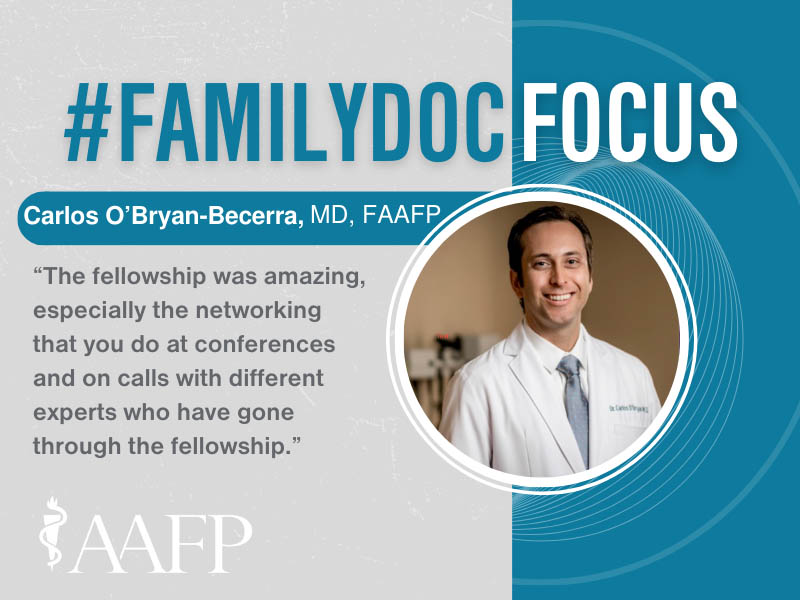Vaccine Fellowship ‘Practice Changing’ for Residency Mentor
April 11, 2024, David Mitchell — As a grandson of a farm worker and son of an immigrant mother, Carlos O’Bryan-Becerra, M.D., FAAFP, understands the obstacles to care that immigrants often face. That’s why as an intern at the Ventura County Family Medicine Residency he partnered with a nonprofit organization and local public health officials to start an annual flu shot clinic that immunized hundreds of farm workers and their families.

“That’s where the interest in vaccines started for me,” said O’Bryan-Becerra, who now serves as core faculty at that same residency program.
O’Bryan-Becerra, like many primary care physicians, was frustrated by patients who were hesitant to get vaccinated, yet more than a decade into practice he found that his training related to vaccines hadn’t give him the tools to deal with such situations.
“I always had to learn the information on my own,” he said. “I would look up the latest recommendations and guidelines, but I wanted to get something more structured where I could have a mentor or a conference to learn more. We often have challenging cases with hesitant patients, and it’s nice to feel comfortable with the data and information in the guidelines so you feel confident about why we’re giving a vaccine.”
O’Bryan-Becerra served as an AAFP’s vaccine fellows in 2022 with James Bigham, M.D., M.P.H., FAAFP of Madison, Wisc. For more than a decade, the fellowship program has worked to develop a group of family physicians interested in, and knowledgeable about, vaccine issues. The fellows help address interactions between public health and the family medicine community.
Fellowship activities include attending a meeting of the CDC Advisory Committee on Immunization Practices as well as vaccine-related conferences, meetings with mentors, monthly calls related to vaccine policy and a self-study project. Applications for the fellowship are open through April 16.
“The fellowship was amazing,” O’Bryan-Becerra, said, “especially the networking that you do at conferences and on calls with different experts who have gone through the fellowship. Talking directly to people who are actually on the ACIP and learning about their work and having a community where you can reach out to other family physicians, ask them questions and get guidance is really invaluable. Getting my co-fellow’s perspective has been practice changing in terms of how I approach vaccine hesitancy.”
Although his fellowship is finished, O’Bryan-Becerra’s work in immunizations is not. He serves as a member of the Ambulatory Childhood Vaccine Advisory Committee for the Ventura County Health Care Agency. In that role, O’Bryan-Becerra was involved in discussions about the rollout of new respiratory syncytial virus vaccines as well as how to prioritize patients for immunizations when those products were in short supply.
He also is involved in a quality improvement project designed to educate clinicians at his residency program to offer HPV vaccines, which previously were initiated at age 11, starting at age 9.
“The idea is starting the vaccine at a younger age in order to get higher levels of adherence and to complete the actual series,” he said.
O’Bryan-Becerra also is mentoring undergraduate students as director of a summer scholars program at Ventura County Medical Center. That eight-week program offers internships to students, especially those from underrepresented backgrounds, who are interested in health professions.
“They get one-on-one shadowing experience with physicians and other health care professionals in the inpatient and outpatient setting,” he said. “This year we’re going to train them to be scribes to work alongside the physicians.”
O’Bryan-Becerra also serves as an advisor for undergraduate students from underrepresented groups at his alma mater, the University of California, Santa Barbara, who are interested in health professions.
“Mentorship and giving back to the younger generation is a passion of mine,” he said. “I encourage them to pursue their dream to become physicians because there is a huge need for family physicians who are from these communities, who speak the patients’ languages and identify with these communities.”
O’Bryan-Becerra said he was fortunate to find a mentor of his own, Miguel Cervantes, M.D., at Las Islas Family Medical Group in Oxnard, where O’Bryan-Becerra practiced for more than a decade before returning to the Ventura County residency program.
“He grew up in the community with parents who were farm workers, and came back after he was done with his training to lead that clinic as a medical director and to provide primary care to under resourced community members,” O’Bryan-Becerra said. “That’s always been the model for me.”